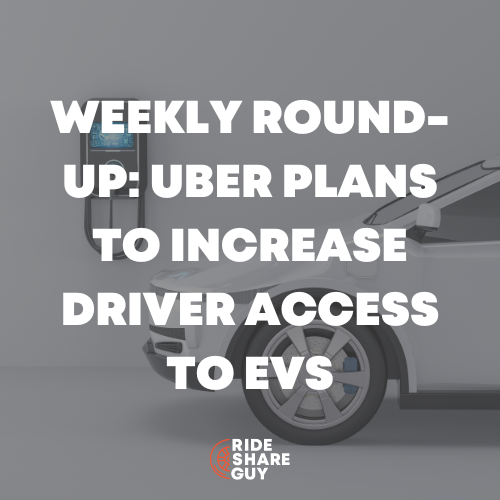Between automated fulfillment centers being established by Instacart and autonomous vehicles going live on the Lyft platform, there’s a lot of AI and robotics taking over this week’s roundup. Catch up with this week’s news as senior RSG contributor Paula Gibbins shares noteworthy articles.
Are you a DoorDash driver who uses the DasherDirect card (it gets you 2% cash back on gas!)? If so, let us know in the comments or via email about what you like and don’t like about the card and service.
Instacart teams with Fabric on automated fulfillment service (Grocery Dive)
Summary: Instacart announced Thursday it plans to offer automated fulfillment as a service to grocers in the U.S. and Canada, and that it has signed a multi-year deal with technology firm Fabric as part of the endeavor.
The service will combine Fabric’s software and robotics with Instacart’s proprietary technology and gig shoppers for fulfillment inside separate warehouses and existing stores, according to the announcement. Instacart said it plans to announce its first retail partnership within the next year.
The announcement marks the first move for Instacart beyond its legacy store-based fulfillment — a major step for the company as online shopping continues to grow well above pre-pandemic levels….
My Take: I know that it says it will be combining robotics and software with gig shoppers, but I’m not certain the end goal would include allowing all shoppers to keep their jobs on the platform. I mean, the whole point of automation is to eliminate those jobs because the automation/robotics can do the job faster, right?
For now, at least, it looks like these fulfillment centers will be where the shoppers go to gather the groceries for the orders, so there shouldn’t be any major changes for gig workers yet.
One big question is how it would work from the customer side. I’m assuming it would look and work a lot like grocery shopping through Amazon. You’re not shopping at a specific store, but instead just finding the specific items you want.
Uber Freight acquires Transplace for $2.25B (Tech Crunch)
Summary: Uber Freight, the logistics business spun out of Uber in 2018, has acquired Transplace for about $2.25 billion from private equity group TPG Capital, according to regulatory filings. The deal announced Thursday will involve $750 million in Uber stock with the remainder in cash.
The acquisition of Transplace marks a ramping up of Uber Freight’s business as it aims to carve out market share in its existing markets and an expansion in Mexico. Uber Freight also sees the acquisition as a means to accelerate the company’s path to profitability and help the segment to break even on an Adjusted EBITDA basis by the end of 2022, according to the company.
The union will fold one of the largest managed transportation and logistics networks into Uber Freight’s platform, which connects truck drivers with shippers that need cargo delivered. Uber Freight’s brokerage will continue to operate independently from Transplace’s services, the company said….
My Take: We’ve talked a lot lately about Uber acquiring businesses and technology, and this is no different, with the small exception that this one involves cash. It’s been fairly common that Uber does a lot of their dealings with stocks alone. This one involves stocks and cash.
Now, I’m not financially inclined, so this could be insignificant, but I feel like it’s not.
Webinar: Inside the Lightning-fast Delivery Revolution

Check out this delivery-geared webinar replay for free!
Argo AI, Ford and Lyft to launch self-driving ride-hail service in Miami and Austin (KFGO)
Summary: Self-driving startup Argo AI, carmaker Ford Motor Co and ride-hail company Lyft Inc on Wednesday said they partnered to offer robotaxi trips to Lyft customers in Miami and Austin.
The service is expected to launch in Miami later this year and in Austin next year with a safety driver inside the Ford Escape hybrid vehicles. Over the next five years, the companies want to deploy at least 1,000 robotaxis in multiple cities.
The first truly driverless cars are expected to launch in 2023, said Jody Kelman, head of Lyft’s autonomous team.
The partnership marks the first large-scale U.S. collaboration between a carmaker, a self-driving developer and a ride-hailing company. The companies hope to gain valuable insights on how to turn robotaxis into a commercially viable business – a challenge no company has yet answered.
As part of the agreement, Argo AI, which is backed by Ford and Volkswagen AG, will receive anonymized data on passenger trips and safety incidents. That will allow Argo to optimize its technology and routing to avoid unsafe streets, Argo CEO Bryan Salesky said in a blog post….
My Take: Wow, fully driverless in two years? That seems ambitious, but maybe that’s the way we all are headed? Will driverless vehicles make it easier for Uber and Lyft to turn a profit since they won’t have drivers to pay? Will it make up for the fact that these platforms will have to come up with ways to fuel the cars and clean them?
I know in this instance Ford is agreeing to fuel, service and clean the vehicles, but for how long? At some point will this be a service that will be charged? Will the cost of these rides be less than with a driver or about the same to make up for those fueling and service costs?
What are your thoughts on Lyft having fully autonomous vehicles on the road as early as 2023? Does that change any of your future plans?
-Paula @ RSG




